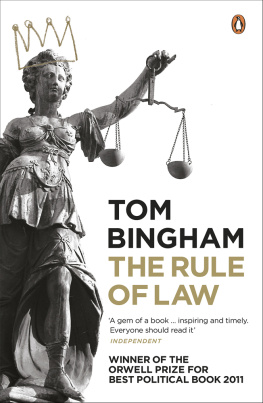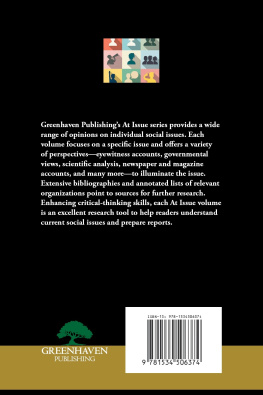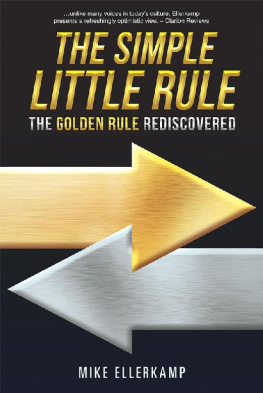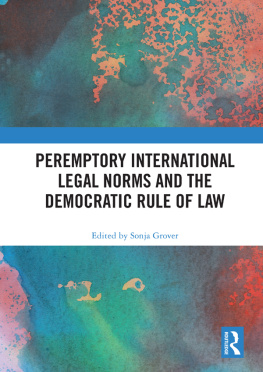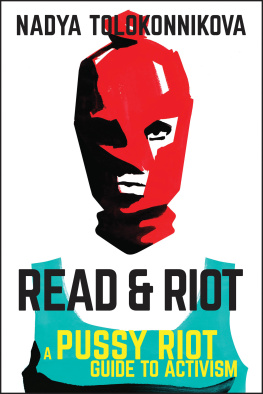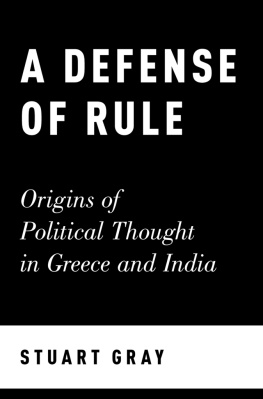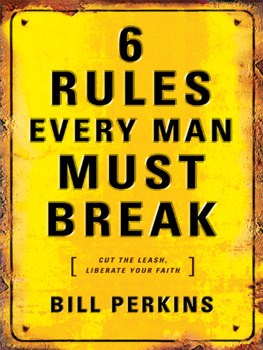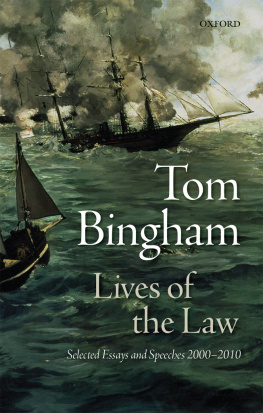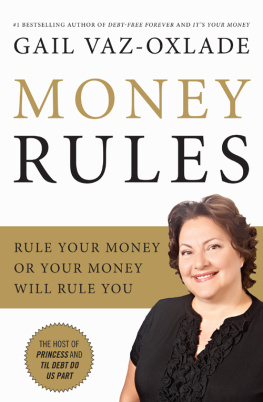TOM BINGHAM
The Rule of Law
PENGUIN BOOKS
PENGUIN BOOKS
Published by the Penguin Group
Penguin Books Ltd, 80 Strand, London WC2R 0RL , England
Penguin Group (USA) Inc., 375 Hudson Street, New York, New York 10014, USA
Penguin Group (Canada), 90 Eglinton Avenue East, Suite 700, Toronto, Ontario, Canada M4P 2Y3 (a division of Pearson Penguin Canada Inc.)
Penguin Ireland, 25 St Stephens Green, Dublin 2, Ireland (a division of Penguin Books Ltd)
Penguin Group (Australia), 250 Camberwell Road, Camberwell, Victoria 3124, Australia
(a division of Pearson Australia Group Pty Ltd)
Penguin Books India Pvt Ltd, 11 Community Centre, Panchsheel Park, New Delhi 110 017, India
Penguin Group (NZ), 67 Apollo Drive, Rosedale, Auckland 0632, New Zealand
(a division of Pearson New Zealand Ltd)
Penguin Books (South Africa) (Pty) Ltd, 24 Sturdee Avenue, Rosebank, Johannesburg 2196, South Africa
Penguin Books Ltd, Registered Offices: 80 Strand, London WC2R 0RL , England
www.penguin.com
First published by Allen Lane 2010
Published in Penguin Books 2011
Copyright Tom Bingham, 2010
All rights reserved
The moral right of the author has been asserted
Except in the United States of America, this book is sold subject to the condition that it shall not, by way of trade or otherwise, be lent, re-sold, hired out, or otherwise circulated without the publishers prior consent in any form of binding or cover other than that in which it is published and without a similar condition including this condition being imposed on the subsequent purchaser
ISBN: 978-0-14-196201-6
PENGUIN BOOKS
THE RULE OF LAW
Tom Bingham, the most eminent of our judges (Guardian), held office successively as Master of the Rolls, Lord Chief Justice of England and Wales and Senior Law Lord of the United Kingdom, the only person ever to hold all three offices. He became a life peer, as Baron Bingham of Cornhill in the County of Powys, on becoming Lord Chief Justice in 1996. In 2005 he was appointed a Knight of the Garter, the first professional judge to be so honoured. He retired in 2008, and in the same year was elected by the Institut de France as the first winner of the Prize for Law awarded by the Alexander S. Onassis Public Benefit Foundation. Tom Bingham died in September 2010, six months after the first publication of this book.
The Bingham Centre for the Rule of Law was established in 2010, with Lord Binghams support, as part of the British Institute of International and Comparative Law, and strives to support the development and strengthening of the rule of law as set out in this book.
The Rule of Law was chosen as a book of the year by Chris Patten (in the Observer), Gideon Rachman (in the Financial Times) and Geoffrey Robertson (in the New Statesman).
For Elizabeth
Preface
In 2006 I was asked to give the sixth Sir David Williams Lecture at the University of Cambridge. This is an annual lecture established in honour (not, happily, in memory) of a greatly respected legal scholar, leader and college head in that university. The organizers generously offered me a free choice of subject. Such an offer always poses a problem to unimaginative people like myself. We become accustomed at school and university to being given a subject title for our weekly essay, and it was rather the same in legal practice: clients came with a specific problem which they wanted answered, or appeared before the judge with a specific issue which they wanted (or in some cases did not want) resolved. There was never a free choice of subject matter.
I chose as my subject The Rule of Law. I did so because the expression was constantly on peoples lips, I was not quite sure what it meant, and I was not sure that all those who used the expression knew what they meant either, or meant the same thing. In any event, I thought it would be valuable to be made to think about the subject, the more so since the expression had recently, for the first time, been used in an Act of the British Parliament, described rather portentously as an existing constitutional principle.
The legal correspondents of the leading newspapers largely ignored the lecture (save on one relatively minor point), understandably regarding it as old hat, and it certainly lacked the kind of outright criticism of the government which whets the appetite of legal correspondents. But Martin Kettle, writing in the Guardian on 25 November 2006, thought the subject of some importance and suggested we need leaders who better understand the rule of law. (On the same day the newspaper carried a headline asking Is this judge the most revolutionary man in Britain?, having a couple of years earlier described me as the radical who is leading a new English revolution. This would have surprised my former tutor, the distinguished historian Christopher Hill. But the headline question was left unanswered, and I should warn those who look to this book for a revolutionary action plan that they are doomed to disappointment.) Since then, interest in this subject has, I think, continued to grow, fortified by concerns about the interrelationship between the rule of law, human rights and civil liberties on the one hand and security against terrorist attack on the other. The subject is one which merits consideration at greater length than is possible in a lecture. But in this book I have drawn heavily on what I said in that lecture and in others.
This book, although written by a former judge, is not addressed to lawyers. It does not purport to be a legal textbook. It is addressed to those who have heard references to the rule of law, who are inclined to think that it sounds like a good thing rather than a bad thing, who wonder if it may not be rather important, but who are not quite sure what it is all about and would like to make up their minds.
I begin in , I consider the impact of terrorism on the rule of law: are the rules of the game changing, as Tony Blair suggested on I discuss the interaction of parliamentary supremacy and the rule of law: a knotty problem, since parliamentary supremacy and the rule of law are usually said to be the two fundamental principles underlying our constitution in the UK, but they may not be entirely harmonious bedfellows.
I am immensely indebted to all those who as academics or judges have contributed to discussion of this subject, and to counsel appearing in numerous cases who have sought to expound, rely on and uphold the rule of law. But my most particular thanks are due to Richard Moules, Matthew Slater and Nicholas Gibson, who, as my successive judicial assistants between 2005 and 2008, have done almost all the digging for material, and to Diana Procter, who has saved me down the years from many errors. None of them, of course, is responsible for my opinions, with which they may well disagree. I owe a special debt to Kate Simmonds, who, in her scenic eyrie above the River Wye, typed and retyped the manuscript of this book. I am lastly very grateful to Caroline Dawnay of United Agents for her help and encouragement, and to Stuart Proffitt of Penguin Books, who conceived the idea of the book and made many helpful suggestions.
I must, finally, plead for mercy on two counts. First, to avoid the cumbrous he or she and his or hers, and the ungrammatical they when used in the singular, I have mostly stuck to saying he or his. I hope that this will be understood in an unchauvinistic, gender-neutral, way. Secondly, I am conscious of referring, disproportionately, in endnote references, to cases in which I have been involved. These are the cases most familiar to me. Perhaps I do not know this was the reason Elisabeth Schwartzkopf gave when, appearing on

